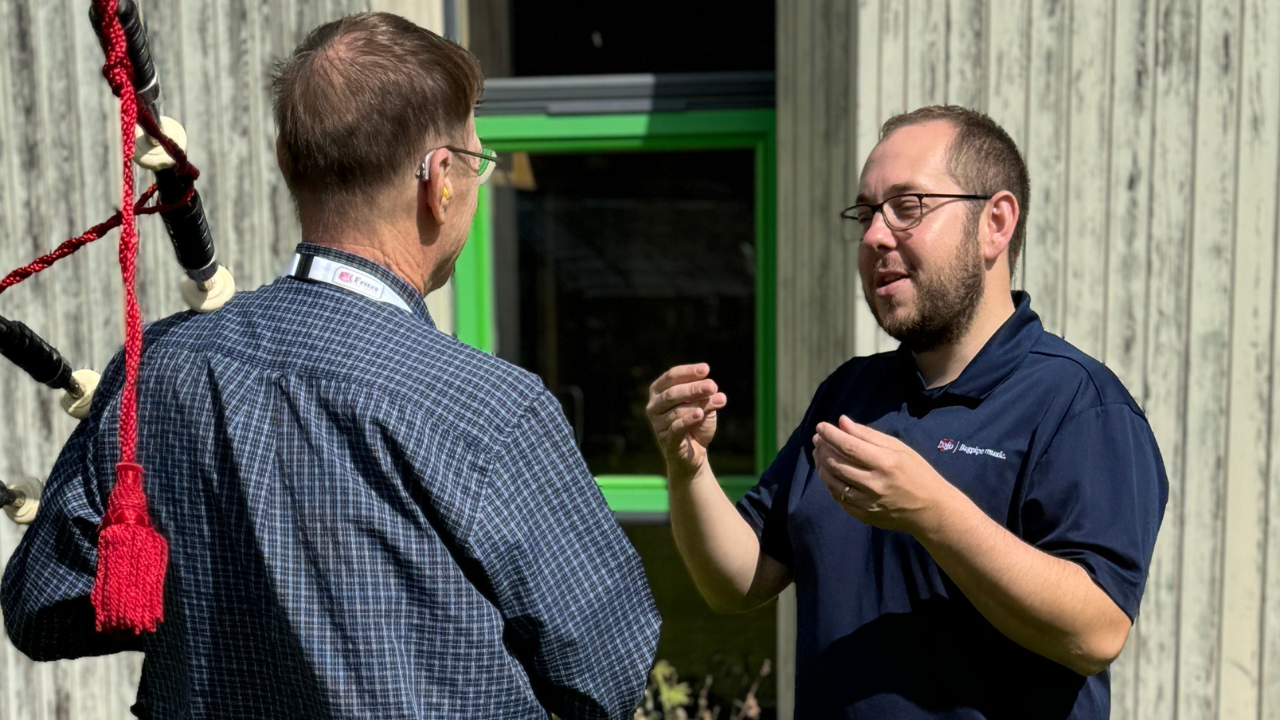Record Yourself Regularly
May 29, 2024
If you want to be a better bagpiper, recording your playing on a regular basis is a ‘must’.
It radically benefits many of your musical fundamentals, habits, and mindset, and can help you perform well under pressure.
It might seem a bit daunting to listen back to recordings of our playing. We’re afraid to come face to face with our faults. But this kind of fixed mindset defies undeniable evidence that to master any skill, you have to record yourself.
Ever called a big company and heard that recorded line, “This conversation may be recorded for quality assurance or training purposes”? Most successful businesses keep detailed records of all of their transactions and processes, so they can analyze them later or use them as examples for training.
Every successful sports team and player spends more time watching ‘game tape’ than they do on the field.
One of the first skills chess players learn is to record their moves after each and every move they make.
Groups that commit to recording as a practise are highly successful. And it’s because recording has an incredible slew of benefits.
Recording helps you focus on the field
When I played in the Simon Fraser University Pipe Band in the early 2000s, I remember our lead drummer Reid Maxwell giving us a stern warning before the World Championships: “On the field, we’re going to be in an all-out battle that requires total focus – you can admire and/or criticize the details later on the recording!”
Sage advice. When you’re performing, you need to focus. If your concentration wavers at all – whether it’s to admire how great you sound, overthink how you sound ‘from the outside’, wonder whether the old granny in the front row has nodded off to sleep or actually needs medical assistance, or nitpick your faults – you won’t produce your best performance.
Recording yourself helps you singularly focus on your performance, because you know you’ll be able to listen back to your output in detail later.
Recording helps you focus when you practise
For the majority of beginners and intermediates, a practise session is usually more what I’d call a ‘jam session’. You play through ‘reps’ of tunes you like, or that your band is learning. You play through them in their entirety. Rarely pick apart troublesome sections to work on them. Put on a bit of a concert for yourself. And if you do any exercises, usually they’re not the main focus of your practise time that day.
When you record yourself, though, you can evaluate where the problem parts of your tune lie. A hint – it’s usually not where you expected when you were playing through! Then, you can determine a small number of objective ways to improve for next time. Mindfully practise these specific objective items for the first 80% of your practise time. Then turn on your recorder, and record that day’s attempt at your material. Finally, in your remaining practise time, jam out on some tunes you enjoy.
The recorder can help separate practise time from analysis time. It gives us time and space to carefully consider what the most important things to improve next time might be.
Recording helps you objectively analyze your playing
The bagpipe world is overrun with bizarrely subjective buzzwords. Judges, pipe majors and tutors may tell you that you’re too round, too flat, lacking finesse, needing light and shade, lacking lift, missing that little something extra… I’m sure these (and many others!) aren’t new to you.
Plus, in the moment, you’re focusing on playing, managing your instrument, remembering the music. It’s impossible to be objective about your performance while you’re in it.
But when you listen back later, you can listen multiple times and start to get to the bottom of why they might have used these vague terms. You might hear that you’re not quite hitting the beat in that part, or have crossing noises creeping in there. Did you select the right tempo for your performance? Are your pipes too hard for you? Is your material too advanced for you (or not advanced enough)?
And once you find the true, objective cause of your problems – you can find an objective solution to them!
Recording helps you defeat performance nerves
If you use the recorder the right way, it becomes a fantastic stand-in to practise performing under pressure.
Here’s what I recommend:
- Once per week at a practise session, set a target time to record.
- No matter what, press record at that time.
- Only allow yourself one take.
- No matter how that take turns out, send it to some pipers that you respect.
By setting a strict time to record, you are simulating a real performance. You’ll need to warm up and plan your tune-up accordingly so you are ready to peak at the given performance time.
By only allowing yourself one take, you are putting pressure on yourself to attempt to produce your best with only one attempt.
And by forcing yourself to send along your recording to piping mentors (whether or not they ever actually listen to it), you amplify the pressure on yourself to deliver a great performance.
While you’ll always feel a rush of adrenaline when it comes time for an important performance, practise makes perfect for managing nerves, just like any other skill.
The Piper’s Dojo Weekly Show brings you weekly advice about how to be a better bagpiper. Tune into our weekly livestreams on our Facebook page, subscribe to our YouTube channel or wherever you listen to your favorite podcasts!
Stay connected - subscribe to our free Weekly Digest!
Get bagpipe knowledge delivered to you every Monday! Tips and tricks, podcasts, special offers, and more.
We hate SPAM. We will never sell your information, for any reason.




